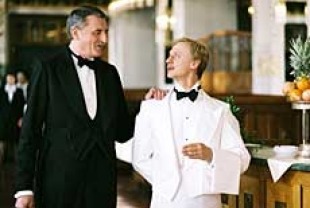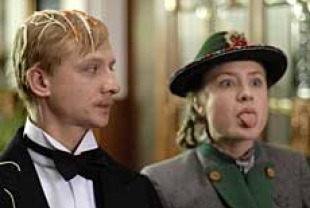In the opening scene of this picaresque film, Jan Ditte (Oldrich Kaiser) is being released from a Czech prison where he has served almost all of his 15-year sentence imposed by the Communists. He is assigned to live in a dingy building in an abandoned German village near the border. The only people in the area are a talkative professor seeking wood to make into instruments and a voluptuous dancer (Zuzana Fialova). As he gazes with lust upon this sexy woman, Jan recalls his past and the rollercoaster rides of his extraordinary life. "It was always my luck," he notes wistfully, "to run into bad luck."
In the 1930s Jan (Ivan Barnev) dreams of becoming a millionaire and running a successful restaurant. He is a short fellow with big ambitions. A very rich traveling salesman (Marian Labuda), who has a knack for figuring out ways to make money, takes him under his wings. Thanks to him, Jan lands a series of jobs. The first one is in a pub where he learns that everyone, rich or poor, is willing to crawl around on the floor to gather coins he has tossed there with abandon. Jan next works in a luxury hotel where he becomes entranced with a sexy blonde whose beauty sends rich men into a swoon. At the brothel, Jan impresses her with his facility for oral sex and for his creative ability to entertain her in distinctive ways.
This young man's career takes another step forward when he becomes a waiter in an elegant nouveau establishment in Prague. Here he is tutored by a superior maitre'd (Martin Huba) who can psych out the needs and desires of customers. He claims to have once served the King of England. For Jan, one of the high points of his life is when the Emperor of Abyssinia visits the hotel and bestows upon him a special medal of honor.
During this period, the protagonist falls in love with Liza (Julia Jentsch), a Sudeten German proud of her Aryan blood. By now the Nazis have taken over Czechoslovakia and are shipping people off to the death camps. When Jan and Liza finally make love, she moves his head so she can get off on a painting of Adolf Hitler hanging on the wall. During the war, Liza goes to the front, and Jan works at a hotel used as a Nazi research center; it's the ideal setting for mating between soldiers of pure Aryan blood and beautiful women. When she returns from the front, Lisa has a valuable stamp collection which she has procured as war booty from Jews. She is convinced that they can now build and run a fantastically successful hotel after the war. But the Communists take over the country, and Jan's days as a millionaire are cut short. In prison, he is rejected by the rich men he knew for years.
Czech director Jiri Mendel is best known for his 1967 film Closely Watched Trains about the coming of age of a train dispatcher during World War II. In this fanciful tale based on a novel by the late Bohumil Hrabal, the thematic sweep is much broader taking on such universal themes as ambition, greed, lust, and indifference to the suffering of others. Politics cannot be ignored especially when human rights are being violated. Jan's selfishness comes back to haunt him in middle age as he realizes his short-sightedness. At one point, he is told by one of his bosses: "Hear, everything, see everything, and then use it to your advantage." He does follow that advice and winds up as a millionaire. But in the process, he loses his soul.
Near the end of his life, Jan states: "A person becomes human almost against his own will." That is exactly what all the spiritual traditions have been saying for centuries. It is edifying to see this played out in a robust and ribald picaresque tale that is filled with many comic moments and propelled by the delightful music of Ales Brezina.


